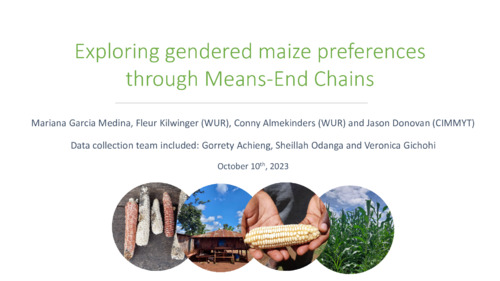Addressing gendered maize seed and trait preferences in Kenya
Abstract
Maize is an important staple and cash crop, contributing to food security and economic development in Kenya. Despite numerous high-quality varieties with increased genetic gains having been released and disseminated, research on maize seed systems (SS) has highlighted slow varietal turnover. Understanding farmers’ preferences for varieties and specific traits has been at the core of SS research as it is recognized that adoption of new varieties is usually slow because varieties often do not meet farmers’ needs and preferences. Previous studies have provided valuable insights demonstrating that, in certain contexts, there are clear distinctions for trait preferences among men and women. Nevertheless, there are still many questions regarding gender-differentiated preferences for maize varieties, for instance, little is known on how these preferences vary across diverse gender intersections and the motivations and values driving seed choices. Aiming to delve into those differences we interviewed 66 maize farmers in two counties in West and Central Kenya. Using means-end chains as methodology, the interviews consisted of a triadic sorting technique to elicit varietal attributes, followed by laddering interviews where participants verbalized their own constructs related to varieties which were subsequently linked to their personal goals and values. The insights of this research can contribute firstly to understanding diverse groups of farmers and secondly to informing public breeding programs to develop and promote maize varieties that not only enhance productivity and profitability but are also adapted to the different needs of women and men smallholder producers to benefit both in an equal manner.

